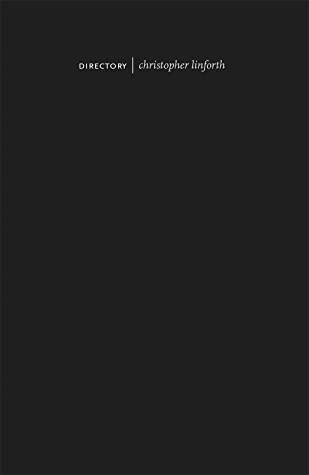
by María Alejandra Barrios
“Everything exists in more than one form.”
–“Counterpoint,” in Christopher Linforth’s Directory.
The story “Counterpoint” opens with the question “What is it to be I versus we?” Christopher Linforth’s work challenges the reader to think about duality and family in numerous ways. Linforth’s elegant and powerful prose invites the reader to join a chorus of collective voices that explore questions of identity, the constant uncomfortableness of growing up and the painful legacy of abuse. The opening story, “Directory,” begins with a scene of a woman in a bath. “Back when we loved our mother, we recorded her telephone calls. Most nights she took the handset into the bath and talked to her string of men.” This is a story with dark undertones that also plays with the idea of discovery and how the twin’s curiosity of sex expands through their mother’s phone calls. This is the tone of Linforth’s Directory: an experimental collection that is not afraid of darkness but that also shows us through the eyes of the characters glimpses of the different stages of growing up.
This book works as an accumulation and as a labyrinth where the characters are constantly trying to find a way to end their pain. Linforth has crafted a book where each story acts separately but adds to a larger, complex narrative where identities and past and present blend together. His rich narratives also cover lifetimes in a few words. In the story “Reunion,” two sisters watch her step-father die: “He owes us a childhood, a good life for our mother. She is gone but we remember her counsel: Don’t believe your stepfather.”
In addition to the many ways Linforth experiments with voice and tense, he also manages to leave room for exploring a variety of themes and forms, including magic realism. In “Visitation,” twins who are eager to talk with their mother visit an aunt who in the words of their “old man,” was a self-proclaimed mystic. This story offers a glimpse into the past life of the mother but also into one of the overarching themes of the book: longing and how we never stop pining after the things we never get to have. The identities of the characters in this collection might be intertwined but what they desire never is. There’s so much longing in these pages: longing for their parents, for the lives and childhoods they never had and at times we get the impression that these characters are searching for anything that resembles a future.
In “Disconnected,” the final story, Linforth ends with the image of hundreds of ringing telephones, an image that resolves the persistent theme of the book of abandonment and strained relationships. Despite the loneliness of the individual and the constant search for identity in Linforth’s characters, in the end, one of the only things that remains is the opportunity for connection.
Directory is a book that shows how many different ways we can use narrative and language in a voice. Despite being told in a collective voice that shifts, the work never feels constricted or scattered; if anything, the choruses of characters feel like an all encompassing force and an affirmation that characters don’t need to be told in first- or third-person narratives to stay with the reader.
__________________
Christopher Linforth is the author of three story collections: The Distortions (Orison Books, 2021), winner of the 2020 Orison Books Fiction Prize, Directory (Otis Books/Seismicity Editions, 2020), and When You Find Us We Will Be Gone (Lamar University Press, 2014). A graduate of Virginia Tech’s wonderful MFA program, Christopher has since worked with Denis Johnson, Rick Moody, and Andre Dubus III, among others. In the last few years, he has been awarded fellowships and scholarships to the Vermont Studio Center, Sewanee Writers’ Conference, The Ragdale Foundation, Virginia Center for the Creative Arts, Atlantic Center for the Arts, and other residencies and conferences. Recently, Christopher has published essays in The Millions on Best American Short Stories, literary podcasts, and contributors’ notes, and other subjects in The Good Men Project, The Pinch, South Dakota Review, Sierra Nevada Review, Whiskey Island, the University of East Anglia’s Hinterland, and in A Harp in the Stars: An Anthology of Lyric Essays (University of Nebraska Press, 2021). His book reviews have appeared in World Literature Today, New Pages, Necessary Fiction, The Rumpus, and other outlets.
Christopher won the 2019 Epiphany‘s Breakout 8 fiction prize. Other recent fiction is in the Notre Dame Review, Fiction International, Grain, Hotel Amerika, BULL, Rock & Sling, Day One, SAND, New World Writing, Popshot, Meridian, Prism International, and Consequence.

 The SmokeLong Grand Micro Contest (The Mikey) is now an annual competition celebrating and compensating the best micro fiction and nonfiction online.
The SmokeLong Grand Micro Contest (The Mikey) is now an annual competition celebrating and compensating the best micro fiction and nonfiction online.